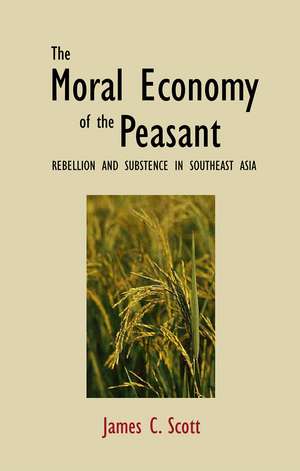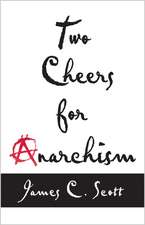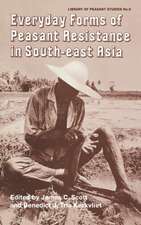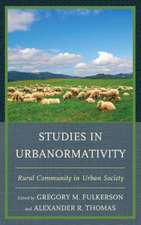The Moral Economy of the Peasant: Rebellion and Subsistence in Southeast Asia
Autor James C. Scotten Limba Engleză Paperback – 10 sep 1977
“Vital to an understanding of peasant politics.”—Library Journal
James C. Scott places the critical problem of the peasant household—subsistence—at the center of this study. The fear of food shortages, he argues persuasively, explains many otherwise puzzling technical, social, and moral arrangements in peasant society, such as resistance to innovation, the desire to own land even at some cost in terms of income, relationships with other people, and relationships with institutions, including the state.
Once the centrality of the subsistence problem is recognized, its effects on notions of economic and political justice can also be seen. Scott draws from the history of agrarian society in lower Burma and Vietnam to show how the transformations of the colonial era systematically violated the peasants’ “moral economy” and created a situation of potential rebellion and revolution.
Demonstrating keen insights into the behavior of people in other cultures and a rare ability to generalize soundly from case studies, Scott offers a different perspective on peasant behavior that will be of interest particularly to political scientists, anthropologists, sociologists, and Southeast Asianists.
Preț: 153.36 lei
Nou
Puncte Express: 230
Preț estimativ în valută:
29.35€ • 30.49$ • 24.38£
29.35€ • 30.49$ • 24.38£
Carte disponibilă
Livrare economică 14-28 ianuarie 25
Livrare express 28 decembrie 24 - 03 ianuarie 25 pentru 19.56 lei
Preluare comenzi: 021 569.72.76
Specificații
ISBN-13: 9780300021905
ISBN-10: 0300021909
Pagini: 254
Dimensiuni: 156 x 235 x 27 mm
Greutate: 0.25 kg
Ediția:0002
Editura: Yale University Press
Colecția Yale University Press
ISBN-10: 0300021909
Pagini: 254
Dimensiuni: 156 x 235 x 27 mm
Greutate: 0.25 kg
Ediția:0002
Editura: Yale University Press
Colecția Yale University Press
Recenzii
“A major work on peasant economy and cultural configurations which provides an original theoretical framework for comprehending peasant behavior and which explains the peasant’s existential dilemma.”—Sociology
“In this major work, . . . Scott views peasants as political and moral actors defending their values as well as their individual security, making his book vital to an understanding of peasant politics.”—Library Journal
“This book will last. No one interested in peasant societies in Southeast Asia, or for that matter elsewhere, can afford to ignore it, and paying it the attention it deserves causes little pan, because it is as well written as it is sophisticated and enlightening. It should be assigned, at least in parts, to undergraduates in ‘Third World’ courses, recommended as a matter of course to graduate students working on social change, and mentioned always to anyone puzzled by the intricacies of economic, social, and political structure in countries with large peasant populations.”—Daniel S. Lev, The Journal of Politics
“In many ways this is a gem of a book. To a high level of scholarhsip conceptualization, analysis, and an original and consistent approach, it adds clear and readable prose. . . . The book should be useful to a wide variety of readers.”—The Annals
“Scott bases his explanation of the technical, social and moral conditions of peasantry on the fear of food shortages. He states that their relationships with each other and with the government form an integral part of the peasant’s leanings towards rebellion and revolution. Based on several case studies, Scott’s investigation into the behavior of these people is rare and sympathetic.”—Asia Mail
“[This book] is regarded in the field of Southeast Asian studies as one of the most important works of its time.”—Asia Bulletin
“In this excellent discussion of social change in agrarian society Scott argues compellingly that problems of a secure subsistence are basic to an understanding of peasants’ reactions to development. His evenhanded, well-written argument uses this central theme and its implications for social justice to examine the violence wrought on peasants’ ‘moral economy’ during the colonial histories of Burma and Vietnam, but it goes far beyond by stressing regional variation and making use of an impressive range of comparisons.”—John W. Gatrell, Rural Sociology
“A thoroughly researched, well-written, sometimes stimulating examination of peasant economies and behavior.”—Allan W. Cameron, Perspective
“This is an important and interesting book. It is good analytical social science which successfully draws on economics and historical, sociological, anthropological, and political science literature in an attempt to understand peasant politics and rebellion. Highly recommended to those interested in economic history and development, Southeast Asia, peasant politics, and theories of rebellion. One hopes it will stimulate further research to test, elaborate, and extend its results.”—David Feeny, Journal of Economic History
“The basic architecture of The Moral Economy has a classical leanness and clarity. Its major premise is that, in the face of the unpredictable and largely uncontrollable violence of natural and man-caused calamity, traditional peasant communities are everywhere obsessed with the problem of survival. . . . This means, Scott argues, that the moral touchstone for peasant evaluation of landlords, officials, taxes, corvees or commercial crops is their impact on the chances for survival rather than for progress or profit. Peasant rebellion comes not when rising expectations are unexpectedly frustrated but when the abyss of famine yawns.”—Benedict Anderson, Journal of Asian Studies
“This work is a profound and fundamental contribution to the issues addressed.”—Sociology
“In this major work, . . . Scott views peasants as political and moral actors defending their values as well as their individual security, making his book vital to an understanding of peasant politics.”—Library Journal
“This book will last. No one interested in peasant societies in Southeast Asia, or for that matter elsewhere, can afford to ignore it, and paying it the attention it deserves causes little pan, because it is as well written as it is sophisticated and enlightening. It should be assigned, at least in parts, to undergraduates in ‘Third World’ courses, recommended as a matter of course to graduate students working on social change, and mentioned always to anyone puzzled by the intricacies of economic, social, and political structure in countries with large peasant populations.”—Daniel S. Lev, The Journal of Politics
“In many ways this is a gem of a book. To a high level of scholarhsip conceptualization, analysis, and an original and consistent approach, it adds clear and readable prose. . . . The book should be useful to a wide variety of readers.”—The Annals
“Scott bases his explanation of the technical, social and moral conditions of peasantry on the fear of food shortages. He states that their relationships with each other and with the government form an integral part of the peasant’s leanings towards rebellion and revolution. Based on several case studies, Scott’s investigation into the behavior of these people is rare and sympathetic.”—Asia Mail
“[This book] is regarded in the field of Southeast Asian studies as one of the most important works of its time.”—Asia Bulletin
“In this excellent discussion of social change in agrarian society Scott argues compellingly that problems of a secure subsistence are basic to an understanding of peasants’ reactions to development. His evenhanded, well-written argument uses this central theme and its implications for social justice to examine the violence wrought on peasants’ ‘moral economy’ during the colonial histories of Burma and Vietnam, but it goes far beyond by stressing regional variation and making use of an impressive range of comparisons.”—John W. Gatrell, Rural Sociology
“A thoroughly researched, well-written, sometimes stimulating examination of peasant economies and behavior.”—Allan W. Cameron, Perspective
“This is an important and interesting book. It is good analytical social science which successfully draws on economics and historical, sociological, anthropological, and political science literature in an attempt to understand peasant politics and rebellion. Highly recommended to those interested in economic history and development, Southeast Asia, peasant politics, and theories of rebellion. One hopes it will stimulate further research to test, elaborate, and extend its results.”—David Feeny, Journal of Economic History
“The basic architecture of The Moral Economy has a classical leanness and clarity. Its major premise is that, in the face of the unpredictable and largely uncontrollable violence of natural and man-caused calamity, traditional peasant communities are everywhere obsessed with the problem of survival. . . . This means, Scott argues, that the moral touchstone for peasant evaluation of landlords, officials, taxes, corvees or commercial crops is their impact on the chances for survival rather than for progress or profit. Peasant rebellion comes not when rising expectations are unexpectedly frustrated but when the abyss of famine yawns.”—Benedict Anderson, Journal of Asian Studies
“This work is a profound and fundamental contribution to the issues addressed.”—Sociology
Notă biografică
James C. Scott (1936–2024) was Sterling Professor of Political Science and Professor of Anthropology Emeritus at Yale University. His many books include Seeing Like a State, Agrarian Studies, The Art of Not Being Governed, and Against the Grain.



















